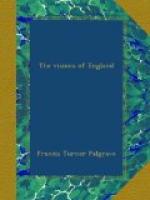The piratical war which followed, in many ways similar to that which the ‘wise Walpole’ tried to avert in 1739, was hardly less impolitic than immoral. It alienated Holland, it sanctioned French aggression on Flanders (xii. 7), it ended by giving Mazarin and Lewis XIV that supremacy in Western Europe for which England had to pay in the wars of William III and Anne; whilst, as soon as it was over, France naturally allied herself with Spain, on a basis which might have caused the union of the two crowns (xii. 8) and which allowed Spain at once to support Charles II. As the result of the Protector’s ‘spirited policy’ England thus figured as the catspaw of France, and the enemy of European liberty.
It is satisfactory, however, to find that, in Ranke’s judgment, the common modern opinion that Cromwell’s despotism was favourably regarded in England because of his foreign enterprize, is exaggerated. Even against the conquest of Jamaica,—his single signal gain,—unanswerable arguments were popularly urged at the time: (xii. 4, 8)—But the Protectorate, in the light of modern research,—like the reign of Elizabeth,—still awaits its historian.
D: p. 127
The sky by a veil; ‘A spiritual world,’ says a critic of deep insight, ’over and above this invisible one, is a most important addition to our idea of the universe; but it does not of itself touch our moral nature. . . . Its moral effect depends entirely upon what we make that world to be.’—Cromwell’s religion, which may be profitably studied in his letters and speeches, (much better known of, than read) reveals itself there as the simple reflex of his personal views: it had great power to animate, little or none to regulate or control his impulses. He had, indeed, a most real and pervading ’natural turn for the invisible; he thought of the invisible till he died; but the cloudy arch only canopied a field of human aim and will.’
The horrible sacrament; The summary of Cromwell’s conduct at Drogheda by a writer of so much research, impartiality, and philosophic liberality as Mr. Lecky deserves to be well considered.
’The sieges of Drogheda and Wexford, and the massacres that accompanied them, deserve to rank in horror with the most atrocious exploits of Tilly and Wallenstein, and they made the name of Cromwell eternally hated in Ireland. It even now acts as a spell upon the Irish mind, and has a powerful and living influence in sustaining the hatred both of England and Protestantism. The massacre of Drogheda acquired a deeper horror and a special significance from the saintly professions and the religious phraseology of its perpetrators, and the town where it took place is, to the present day, distinguished in Ireland for the vehemence of its Catholicism:’ (Hist. of Eighteenth Cent. ch. vi).




